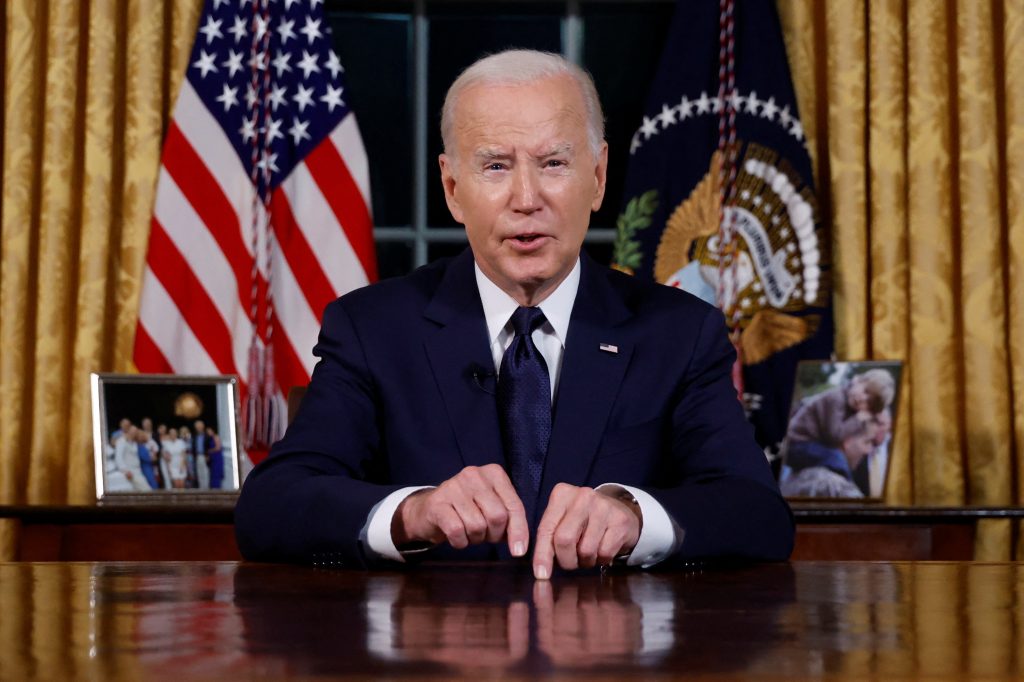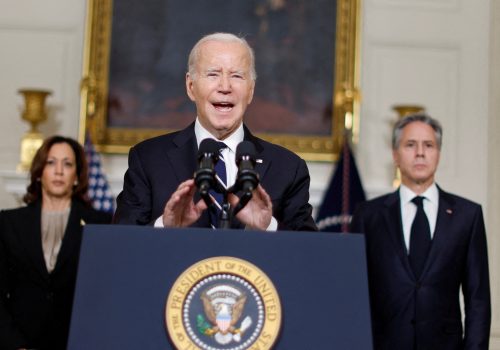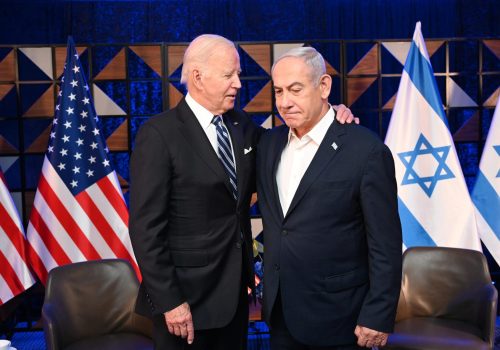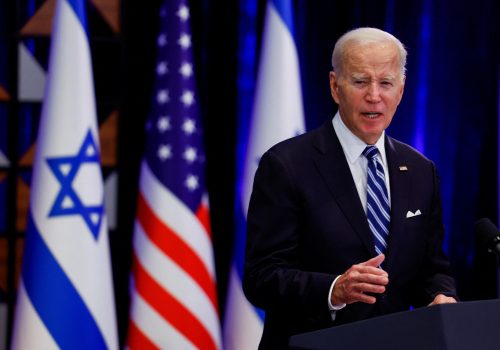“We are facing an inflection point in history.” On Thursday evening, US President Joe Biden spoke to Americans from the Oval Office—in only the second such address of his presidency—to tie together the conflicts in Israel and Ukraine as part of a larger struggle for democracy and freedom. Biden made the case that US leadership in these global crises will make the United States safer. He leveled with Americans that this safety will come at a cost, calling on Congress to pass an “unprecedented” aid package for Ukraine and Israel. But he also told Americans that the cost of walking away from these wars would be much higher.
Below, Atlantic Council experts assess Biden’s big speech and what to expect next.
John E. Herbst: Biden’s second bravura presidential moment in two days is a legacy-builder
Jenna Ben-Yehuda: Biden rallies Americans as global defenders of democracy. Will it work?
Thomas S. Warrick: It’s all about the money—and vital US national interests
Shelby Magid: Biden gives arguments both parties can embrace for a Ukraine-Israel aid package
Daniel Fried: This was an application of US grand strategy from Truman to Reagan
Jonathan Panikoff: Biden backs his allies’ wars of necessity
Biden’s second bravura presidential moment in two days is a legacy-builder
It has been a good week for Joe Biden. In a tour de force, he visited Israel and delivered a pitch-perfect message of support for its embattled people and some careful observations on how to deal with the challenges ahead. Then one day after that trip, he gave a powerful speech from the Oval Office laying out the major dangers presented to global order, vital US interests, and US leadership by Vladimir Putin’s aggression to subdue Ukraine and Hamas’s savage attack on Israel. US presidents are usually elected for reasons related to the economy and other domestic issues, but presidents often establish their legacy at moments of international peril.
Even before Putin launched his massive invasion of Ukraine in February of 2022, the Biden administration laid out a sensible policy to deter Russia and then to make sure it did not succeed: 1. major sanctions on Russia; 2. political isolation of Russia; 3. the provision of substantial military and economic support to Ukraine; and 4. strengthening NATO defenses in the east. It took great effort to implement this successfully.
But one thing the White House had not done was to explain to the American people why the United States was leading this major effort. Biden checked that box tonight. He explained that if Putin wins in Ukraine, he might march west and attack our NATO allies, which the United States would be obliged to defend. He reminded the American public that Ukraine was only asking for the means to defend itself. Providing the military and economic assistance that Ukraine needs is therefore the smart and economical way to protect the United States and its allies. He pointed out that if Putin wins in Ukraine, it would also embolden aggressors elsewhere. That would erode American leadership. He noted too that Ukraine and Israel are democracies attacked by authoritarians bent on their destruction. Stopping them is consistent with our values as Americans.
To help defend our interests, the president noted that he was sending a request to Congress for substantial aid to Ukraine and Israel, and he expected us to overcome our divisions in dealing with these challenges. That aid is essential to defend American interests, and his handling of it was a smart, statesmanlike way to address the disorder in the US House of Representatives.
It was Biden’s second bravura presidential moment in two days. In its clarity, strategic focus, and sunny summons of American values and leadership, it recalled Ronald Reagan at his best. This is good for Biden and better for us.
—John E. Herbst is the senior director of the Atlantic Council’s Eurasia Center and a former US ambassador to Ukraine.
Biden rallies Americans as global defenders of democracy. Will it work?
Biden’s Oval Office address to the nation sought to answer one central question regarding the conflicts between Israel and Hamas and Russia and Ukraine: “Why should the American people care?” Against the domestic political backdrop of a speaker-less Republican Party, a barely avoided government shutdown, and a deeply divided nation, Biden sought to unify the American people as global defenders of democracy.
The rhetoric was about more than drawing important parallels between the wars in Ukraine and Israel. Biden is hoping that his message will compel lawmakers—under pressure from their constituents—to pass the forthcoming package of direct military aid to both nations that he previewed tonight. An omnibus aid package could offer something for a spectrum of Israel supporters and Ukraine skeptics alike. Or, alternatively, some could weaponize its sticker shock to draw the nation inward. But this is where Biden’s appeal for support rightly extended beyond the theoretical: Just twelve days after Hamas’s terrorist attack on Israel, American Jews and Muslims have begun to face heightened threats to their safety as a result of anti-Semitic and Islamophobic violence across the nation—with deadly consequences already in Illinois, where a six-year-old Palestinian-American child was brutally murdered for his faith.
The big question is whether Biden’s case was strong enough to move Republican lawmakers reluctant to cede any perceived win to a president with just thirteen months to go in his quest for reelection. The unity that the United States experienced after the 9/11 attacks seems a distant memory. Can Biden, who has invoked 9/11 to describe the aftermath of Hamas’s terrorist attack in Israel, summon the same resolve that followed that national trauma? The forthcoming funding request will serve as a test, and US allies and foes alike will be watching to see if the United States passes it.
—Jenna Ben-Yehuda is the executive vice president of the Atlantic Council, and the former president and chief executive officer of the Truman National Security Project and the Truman Center for National Policy.
It’s all about the money—and vital US national interests
There was one important takeaway from Biden’s speech beyond his strong words of support for embattled democratic allies Ukraine and Israel, his words of support for innocent Palestinians caught in the crossfire between Hamas and Israel, and his warnings denouncing both anti-Semitism and Islamophobia in the United States.
It was the money—and the link to vital US national interests.
Over the years, administrations of both parties have written brilliant strategies that have failed because no one appropriated the funds needed to turn those strategies into reality. In today’s Washington, “thoughts and prayers” has become a cynical cliché about doing nothing real to address the nation’s problems.
So what made tonight’s speech especially important was that the president said he would ask for serious money—reportedly one hundred billion dollars for the next year—for the “arsenal of democracy,” a phrase he has brought forward from President Franklin Roosevelt in 1940. Of this, roughly sixty billion is for Ukraine, ten billion is for Israel, and the remaining thirty billion is for Taiwan, the Indo-Pacific, and border security.
Biden’s speech linked support for Ukraine and Israel to the United States’ vital national interests. Ukraine is under attack by Russia, which, as Biden reminded everyone, seeks to destroy Ukraine as an independent nation and to re-establish the Soviet empire. Israel is under attack by a terrorist group intent on Israel’s destruction, with two million Gazans caught in the crossfire. These are among the United States’ most vital national security interests.
The cost of doing nothing in these areas is far greater than what the president is asking from the Congress. Asking for billions of dollars to achieve vital US national interests is how you show seriousness in today’s Washington.
—Thomas S. Warrick is a senior fellow and director of the Future of DHS Project at the Atlantic Council. He served in the Department of State from 1997-2007 and as deputy assistant secretary for counterterrorism policy at the US Department of Homeland Security from 2008-2019.
Biden gives arguments both parties can embrace for a Ukraine-Israel aid package
Moscow may have been pleased over the past couple weeks as it watched the government scramble in Washington to commit to Ukraine aid, while the crisis in the Middle East took over the news cycle, but Biden’s powerful speech from the Oval Office should be a strong reality check—US support for Ukraine is not waning.
Biden’s long-awaited Ukraine-focused Oval Office speech made it clear to the American public and the world that support for Ukraine, as well as Israel, is a national security priority and firmly in American interests. As the president said, “American values would be at risk if we walk away from Ukraine.” That’s not a stance the US government or people will back down from lightly.
The president’s speech came at a critical time as support for Ukraine aid was coming into question on Capitol Hill, mainly in the House, despite polls, including one from Quinnipiac released this week, showing that the majority of voters understand supporting Ukraine is in the national interest. While directly linking Hamas’s brutal attack on Israel and Russia’s invasion of Ukraine, Biden gave a thorough overview of the reasons that supporting our allies Israel and Ukraine remains necessary and urgent.
Biden squarely acknowledged that these conflicts can feel far away and, feeling disconnected, the public questions why what happens in Israel and Ukraine matters for Americans. Biden provided strong arguments that both parties can use to back up the argument that this effort is in the US interest, as he announced that he’s sending an urgent request to Congress for a substantial package of aid for both Israel and Ukraine—which will require support from both Democrats and Republicans to become law.
Perhaps smartly, he did not mention the exact price tag for the aid package (reportedly around one hundred billion dollars), but the compelling arguments coupled with the inclusion of aid to Israel make it far more difficult for those who might oppose passing Ukraine aid on its own to go against this presidential request. For as Biden said, we cannot let terrorists win. And if we don’t give Ukraine and Israel the aid they need to defend themselves, we’re putting them deeply at risk—as well as ourselves.
—Shelby Magid is the deputy director of the Eurasia Center.
This was an application of US grand strategy from Truman to Reagan
Biden’s Oval Office address laid out the case for US support of Israel and Ukraine, framing the argument in terms of American power and responsibility: “American leadership is what holds the world together” was the core of the argument—i.e., that the United States has responsibilities to back its principles and its friends against terrorist groups and dictators. He weaved together strategy, values, and US interests, linking “the idea of America, the promise of America” with American interests in supporting Israel and Ukraine. This was an application of US grand strategy from Truman to Reagan.
The problem is that neither this speech nor any fifteen-minute Oval Office speech could do justice to the complexities of the two wars, especially the Israel-Hamas war. Biden rightly referred to the rights of Palestinians and cautioned against acting in anger but did not outline a way out of the conflict. He did not attempt to define the precise goals the United States seeks in supporting Ukraine. He didn’t do a lot of other things in the speech and critics will have a field day pointing out various “he could have said’s.”
But Biden’s purpose seemed different: This was a speech to rally US support for an internationalist agenda and the funding for Israel and Ukraine to back it; he asserted, like Franklin Roosevelt, Harry Truman, John F. Kennedy, and Ronald Reagan before him, that US interests and US values are interwoven and then argued that both are at stake in the two conflicts. It was a speech rooted in a belief in American leadership in the world, in a conviction that the US national interest requires not just transactional deals but a higher purpose. It’s a tough case to make to a skeptical US public, with cynical isolationism coming back as a political force for the first time in generations, but a critical one.
—Daniel Fried is the Weiser Family distinguished fellow at the Atlantic Council and a former US assistant secretary of state for Europe.
Biden made strong points, but failed to explain why Ukraine and Israel matter to everyday Americans
Biden deserves praise for making his case directly to the American people. He made some strong points, including “American leadership holds the world together,” and “American values make us a partner that other countries want to work with.” He also clarified some important misconceptions, explaining that much military aid goes to drawing down US stocks, while fueling defense production in the United States and the ultimate replenishment of American stocks.
Still, ultimately, I believe the speech fell short. Biden needed to explain what he hopes to achieve in Israel and Ukraine, how he plans to do that, and why the outcome of these conflicts matters to the kitchen table concerns of everyday Americans. He did not do that.
—Matthew Kroenig is vice president and senior director of the Atlantic Council’s Scowcroft Center for Strategy and Security.
Biden backs his allies’ wars of necessity
Tonight, against the backdrop of his own political and domestic challenges, Joe Biden demonstrated what US leadership in the world looks like. Biden’s speech is best viewed in the context of an age-old question: How many times must we repeat the same mistakes?
This Saturday will mark two weeks since the deadliest attack on the Jewish people since the Holocaust. The lessons the world learned from that atrocity, and from World War II more broadly, resonate today more than ever. Peace should always be the goal. But while a peace achieved by the appeasement of autocrats and terrorists may calm tensions temporarily, it is likely to lead to a far bigger conflict in the future. We are, as the president said, at an “inflection point.”
There are times when the United States can shape the reality of the world, and times when the United States must live within the world’s confines; this is an opportunity to do the former. US allies are not always democracies, nor are they always inclined to hedge toward the liberal international order. But if the United States does not stand up to support democracies such as Israel and Ukraine, no matter how imperfect they are, then the message its other global allies will receive is that the United States will certainly not stand up for them when their country is threatened and their security challenged.
Perhaps worse is the signal such an outcome would send to the United States’ biggest adversaries. Not supporting Israel would tell Iran that it is free to continue empowering terrorists and that its quest for Israel’s annihilation is within reach. Not supporting Ukraine would signal to Russia that Moscow is free to pursue its goal of reunifying the Soviet Union. And it would send a message to China that the United States’ retreat from its role as a global leader, even one in a multipolar system, is complete and that Beijing is now free to grab and occupy that opening.
There is a difference between a war of choice and a war of necessity. And what Biden highlighted tonight is that Israel and Ukraine are both engaged in wars of necessity—wars required to ensure the security of their people, to defend their homelands, and to safeguard democratic ideals.
—Jonathan Panikoff is the director of the Scowcroft Middle East Security Initiative in the Middle East Programs and a former deputy national intelligence officer for the Near East at the US National Intelligence Council.
Further reading
Thu, Oct 12, 2023
Israel, Ukraine, and how Biden should connect the dots
Inflection Points By Frederick Kempe
When Biden does get around to making his speech on Ukraine, he should discuss the attacks on Israel and how the US and its allies face the greatest threat to global order since the 1930s.
Wed, Oct 18, 2023
The Israel visit was just the start. Here’s what Biden needs to do next.
New Atlanticist By William F. Wechsler
The US and Israel should develop and publicly issue a joint set of common principles that will guide the future of Gaza, once Israel’s full military objectives against Hamas are reached.
Wed, Oct 18, 2023
Experts react: What did Biden achieve in his visit to Israel?
New Atlanticist By
Atlantic Council experts share their insights on the implications of Biden’s visit for Israel and the wider region.
Image: U.S. President Joe Biden delivers a prime-time address to the nation about his approaches to the conflict between Israel and Hamas, humanitarian assistance in Gaza and continued support for Ukraine in their war with Russia, from the Oval Office of the White House in Washington, U.S. October 19, 2023. REUTERS/Jonathan Ernst/Pool



